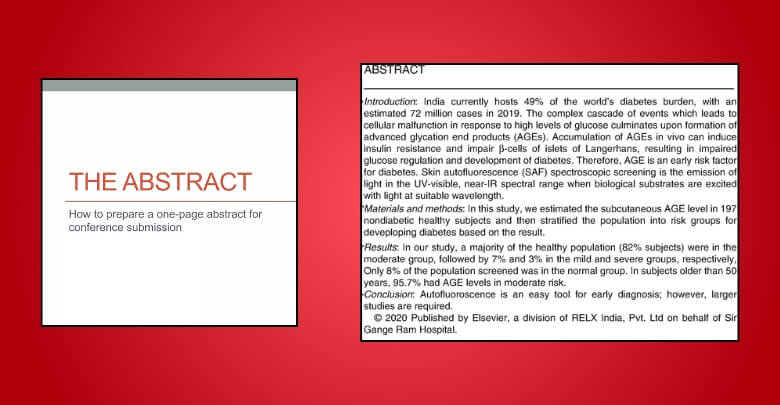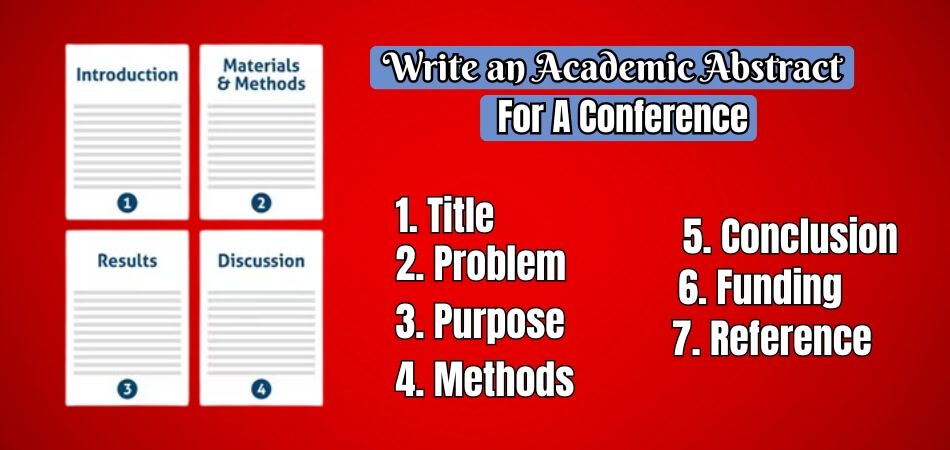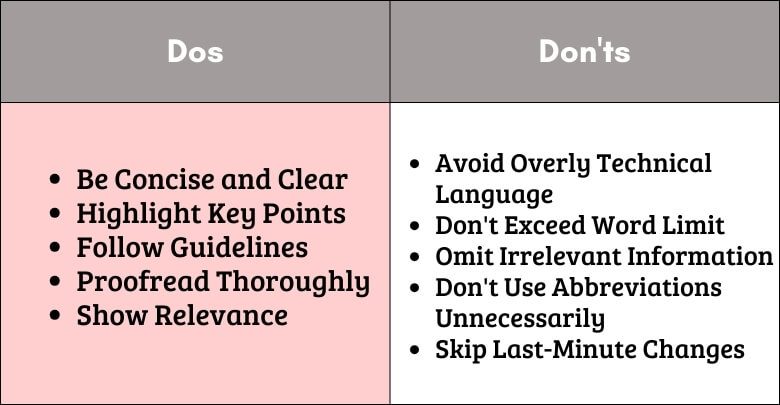Writing an academic abstract can be intimidating, especially when it’s for a conference where your work will be judged by peers and experts. Whether you’re an experienced researcher or a first-timer, knowing how to write an academic abstract for a conference is crucial for sharing your ideas effectively.
So, what makes a conference abstract successful? It’s all about providing a concise summary of your research, highlighting its purpose, methods, results, and significance—within a limited word count. Clarity and impact are key, as these will capture the interest of reviewers and attendees.
Curious to learn more? In the following sections, you’ll discover practical steps, essential tips, and common pitfalls to avoid when crafting an impactful academic abstract for a conference. Keep reading to ensure your abstract stands out.
What Does the Academic Abstract Signify for A Conference?
An academic abstract serves as the gateway to your research at a conference. It’s more than just a summary—it’s the first impression that reviewers and attendees will have of your work.
In just a few sentences, it outlines your research’s purpose, methods, results, and relevance, setting the tone for your presentation. It helps the conference organizers understand how well your study aligns with the event’s themes and goals.
For attendees, a well-written abstract offers a quick glimpse into what your presentation will cover and why it matters. Essentially, it’s your chance to persuade readers that your research deserves their attention. Identifying reliable conferences to join can increase the impact of your abstract by ensuring it reaches the right audience.
By clearly communicating the significance and originality of your work, your abstract can increase the likelihood of acceptance and attract interested participants.
An academic abstract paper is a critical component of conference submissions, summarizing the core aspects of your research. It provides a brief overview, allowing readers to quickly grasp the essence of your work. Here are the key elements typically included in an academic abstract:
- Research objectives are the goals your study aims to achieve. They provide a clear focus for your investigation.
- Methodology describes the approach and techniques used to conduct your research. It ensures that your study can be replicated.
- Results present the findings of your research. This section highlights the most significant data or outcomes discovered.
- Conclusions summarize the implications and importance of your findings. They connect your results to broader research or practical applications.
- Relevance to the conference theme demonstrates how your work aligns with the event’s focus. This ensures your research is pertinent to attendees.
Including these elements in your abstract ensures it is comprehensive and informative. Crafting each part carefully will help convey the significance of your research effectively.
How to Write an Academic Abstract for A Conference?
Writing an academic abstract for a conference can be challenging, but it’s also an excellent opportunity to showcase your research to a broader audience. A well-written abstract not only communicates the essence of your work but also engages readers and encourages them to attend your presentation. Here’s a step-by-step guide to help you write a compelling abstract that stands out.
Step 1: Understand the Conference Guidelines
Before you start writing, carefully review the conference’s submission guidelines. Every conference has specific requirements, such as word count, formatting, and content structure.
Being familiar with these guidelines ensures that your abstract meets the criteria and increases the chances of acceptance. It’s essential to follow the rules closely to avoid immediate disqualification.
Step 2: Begin with a Clear Research Objective
Your abstract should start with a clear statement of your research objective. Explain the purpose of your study and why it’s relevant.
This sets the context for readers, allowing them to understand what your research aims to achieve. A strong opening statement grabs attention and makes your research seem essential to the field.
Step 3: Describe Your Methodology Clearly
The methodology section is crucial, as it explains how you conducted your research. Provide an overview of the approach, techniques, and tools used, ensuring it aligns with your research objectives.
Highlighting the reliability and validity of your methods can also improve credibility. When writing an abstract for conference presentation, it’s important to make your methodology easy to understand for a diverse audience.
Step 4: Present Your Key Findings
Once you’ve outlined the methods, it’s time to present the main results of your study. Summarize the most significant findings, focusing on those that add value to the topic.
Be concise but clear, as this is the core of your abstract. Readers should easily grasp the outcomes, making them interested in your full presentation.
Step 5: Discuss the Implications of Your Research
An abstract isn’t complete without discussing the implications of your findings. Explain how your research contributes to existing knowledge or solves a problem in your field.
This section connects your results to broader applications, showing the relevance of your work to the conference theme. It’s a chance to highlight the impact of your research on academia or practice.
Step 6: Conclude with a Strong Summary
Wrap up your abstract with a compelling conclusion that reinforces the importance of your study. Summarize how your research objectives, methods, findings, and implications come together. Make it clear why your presentation would benefit conference attendees. A strong ending encourages reviewers to prioritize your submission.
Step 7: Edit and Revise for Clarity
After drafting, revise your abstract to ensure clarity, coherence, and conciseness. Check for grammatical errors, awkward phrasing, and overly complex language. The goal is to make your abstract easy to read and understand while retaining its academic standards.
Writing an academic abstract for a conference may seem challenging, but with a clear focus and structured approach, you can create a compelling summary of your research. Remember, a well-crafted abstract is your ticket to engaging with a global audience of experts.
Tips for Writing a Compelling Conference Abstract
Writing a compelling conference abstract is your chance to make a strong impression and secure your spot as a presenter. Your abstract should be clear, engaging, and aligned with the conference theme. Here are some practical tips to make your abstract stand out.
- Start with a Strong Hook: Open with a sentence that immediately captures interest. Whether it’s a bold statement, a question, or a surprising fact, your opening should set the tone for the entire abstract.
- Be Clear and Concise: Avoid jargon and keep your language simple. Focus on delivering your message clearly, making it easy for reviewers and attendees to grasp your research’s essence.
- Highlight the Problem and Solution: Clearly state the research problem and how your study addresses it. Be specific about the solution or contribution your research provides.
- Showcase the Methods: Briefly outline your research methodology, emphasizing the techniques used. This adds credibility and helps readers understand your research’s rigor.
- Include Key Results: Summarize the most significant findings of your study. Make sure they are relevant and impactful, giving readers a reason to attend your presentation.
- Align with the Conference Theme: Mention how your research aligns with the conference’s core themes or goals. This increases the chances of acceptance and demonstrates its relevance to the audience.
- Edit Ruthlessly: Review your abstract for clarity, grammar, and coherence. Cut unnecessary words and ensure each sentence adds value.
Presenting an Academic Abstract Paper to A Conference- How It Benefits You?
Presenting an academic abstract paper at a conference offers numerous advantages. It provides opportunities to share your research, gain valuable feedback, and network with peers. Here are the top five benefits of presenting your abstract at a conference:
Improved Research Visibility
Showcasing your work increases its visibility among academics. This exposure can lead to collaborations and future research opportunities. Being recognized for your research contributes to your professional reputation.
Increased visibility also helps in gaining recognition within your field. This recognition can open doors to new academic and career prospects. The use of conference papers further encourages engagement with your research by spreading awareness among participants.
Receive Constructive Feedback
Presenting at a conference allows you to get feedback from experts. This feedback is invaluable for refining your research. Engaging with others can provide new perspectives and ideas.
The insights gained can help improve your study. Constructive criticism often highlights areas needing further exploration. This process is essential for academic growth and development.
Network with Professionals
Conferences are ideal for meeting peers and experts in your field. Networking can lead to collaborations and mentorship opportunities. Building relationships with others can enhance your professional journey.
Networking also allows for the exchange of ideas. This exchange can inspire new research directions and projects. It creates a community of support and shared knowledge.
Enhance Your Academic Profile
Presenting at conferences strengthens your academic profile. It demonstrates your active involvement in the research community. This involvement is crucial for career advancement and opportunities.
An enhanced profile can attract attention from academic institutions. It showcases your commitment to advancing your field. This recognition is beneficial for future endeavors and applications.
Gain Presentation Experience
Conference presentations improve your public speaking and presentation skills. These skills are vital for academic and professional success. Regular practice builds confidence and competence in delivering your research.
Experience in presenting also prepares you for future academic roles. Teaching, lecturing, and further presentations become easier. This experience is an asset in both academic and professional settings.
Presenting an academic abstract paper at a conference is a significant step in your academic career. It offers numerous benefits, from gaining visibility and feedback to networking and enhancing your profile. Embrace these opportunities to further your research and professional growth.
Dos and Don’ts While Writing an Academic Abstract Paper for A Conference
Writing an academic abstract for a conference requires careful attention to detail and clarity. Knowing the dos and don’ts can help you create a compelling and effective abstract. Here are some key guidelines to follow:
Dos
- Be Concise and Clear: Use straightforward language to convey your research. Avoid unnecessary jargon and ensure your abstract is easily understandable.
- Highlight Key Points: Focus on the most important aspects of your research. Ensure the objectives, methods, and results are clearly presented.
- Follow Guidelines: Adhere to the conference’s submission requirements. Check word limits and formatting rules carefully before submission.
- Proofread Thoroughly: Review your abstract for spelling and grammar errors. A polished abstract reflects your professionalism and attention to detail.
- Show Relevance: Explain how your research aligns with the conference theme. Demonstrating relevance can increase the chances of acceptance.
Don’ts
- Avoid Overly Technical Language: Don’t use complex terminology that might confuse readers. Aim for clarity and simplicity in your writing.
- Don’t Exceed Word Limit: Stay within the specified word count. Exceeding the limit can result in rejection or require unnecessary editing.
- Omit Irrelevant Information: Focus on essential details. Including unnecessary information can dilute the impact of your abstract.
- Don’t Use Abbreviations Unnecessarily: Avoid using too many abbreviations or acronyms. If necessary, ensure they are clearly defined.
- Skip Last-Minute Changes: Don’t make changes at the last minute without careful review. Last-minute edits can introduce errors and affect clarity.
FAQs About How to Write an Academic Abstract for A Conference?
When it comes to writing an academic abstract for a conference, many researchers have specific questions about the process. Here are some common FAQs that can help clarify your doubts and make your abstract more effective:
Do I Need to Write a Title for My Abstract?
Yes, you must write a title for your abstract. It should be concise, relevant, and accurately reflect the main topic of your research. A strong title grabs attention and sets the tone for the rest of your abstract.
Can an Abstract Include References or Citations?
No, an abstract typically does not include references or citations. The purpose of an abstract is to provide a brief overview of your research, focusing on objectives, methods, results, and implications. Keeping it clear and concise is key, without diverting to other studies.
What is the Ideal Word Count for an Abstract?
The ideal word count for an abstract varies based on conference guidelines but usually ranges from 150 to 300 words. It’s crucial to check the specific requirements of the conference to ensure your abstract meets the word limit. Avoid exceeding the limit, as it could lead to disqualification.
Can I Submit the Same Abstract to Multiple Conferences?
Yes, you can submit the same abstract to multiple conferences, but it’s important to consider any overlapping submission deadlines. However, formatting your abstract to match the theme of each conference can increase the likelihood of acceptance. Be sure to avoid simultaneous presentations if both conferences accept your submission.
Is It Okay to Use Technical Language in an Abstract?
Using technical language is acceptable, but it should be clear and relevant to the audience. Avoid excessive jargon, as it can make the abstract difficult to understand for non-specialists. Aim for clarity while maintaining the accuracy of your research concepts.
Final Words
Mastering how to write an academic abstract for a conference is a skill that can significantly enhance your research visibility. With the right approach, you can create a concise yet impactful summary that captures the essence of your work and aligns with the conference’s theme.
Remember, clarity and relevance are key. Focus on a strong structure that includes your objectives, methods, results, and implications, ensuring each part flows logically. An engaging abstract not only increases your chances of acceptance but also attracts attendees to your presentation.
Regardless of whether you’re an experienced researcher or new to presenting, writing an effective abstract is crucial for capturing attention and creating valuable connections. So, take your time, follow the guidelines, and let your research shine.








